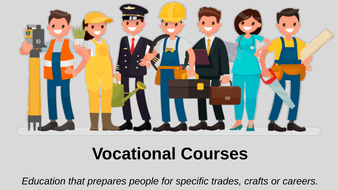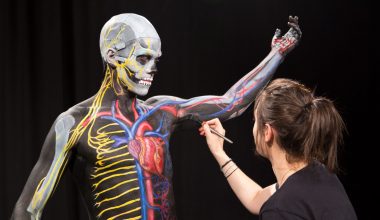If you’ve ever seen adults with cool jobs and wonder how they got there, those amazing careers often begin with vocational courses. What are vocational courses?
They aren’t your typical traditional subjects. They are mostly like boot camps for special skills. They involve getting hands-on experience and job-ready knowledge in a field you love. That is, you learn on the job. It is more like someone who is learning to cook – instead of just reading up recipes and articles about cooking, you are in the kitchen, whipping up amazing dishes instead.
People who cannot afford a degree currently enroll in vocational training. For a few who may not still understand what vocational studies entail, this article sheds more light on the topic, as well as some of the popular vocational courses after the 12th and 10th grades.
Table of contents
What are vocational courses?
Vocational courses are career-oriented or technical courses designed to provide specific skills and practical knowledge required for a particular job.
Basically, these courses focus on hands-on training and are distinct from traditional academic programs. And they equip students with the expertise needed to excel in their chosen industry.
Vocational courses are tailored to provide specialized expertise, often in technology, healthcare, art, mechanics, hospitality, and more.
Vocational courses enable individuals to enter the workforce with a strong foundation of skills and practical experience, enhancing their employability and success in their chosen field.
Read Also: What Is A Traineeship? A Guide To Applying For Traineeships
Types of Vocational Courses
Yes, several vocational courses cater to different industries and career paths.
You can find vocational training that provides specialized skills and knowledge for specific professions. Some lead to a specific job, while others take in apprentices who train for a specific job role while paying them.
Here are some common types of vocational courses:
- Technical Vocational training
- Healthcare Vocational Courses
- Hospitality and Culinary Courses
- Art and Design Vocational training
- Business and Management Courses
- Information Technology (IT) Courses
- Trade and Craftsmanship Courses
- Beauty and Wellness Courses
- Agricultural and Environmental Courses
- Media and Communication Courses
- Language and Translation Courses
- Education and Training Courses
Read Also: How Many Apprenticeships Can You Do In The UK?
Benefits of Vocational Courses
Vocational courses offer numerous advantages over traditional academic programs. Firstly, they have a shorter duration, allowing you to enter the workforce sooner.
Additionally, the practical nature of these courses ensures you gain industry-relevant skills in high demand.
Many vocational courses also strongly emphasize internships and real-world experiences, providing you with a taste of your future career.
Also, read: What is an Internship in UK? Meaning, Definitions & How to Get One
Vocational Courses vs Vocational Subjects
Both are types of vocational qualifications. However, vocational subjects are individual subject areas within a broader educational curriculum. They focus on providing specific practical skills and knowledge.
On the other hand, vocational courses are structured educational programs that offer focused and practical training in a specific trade, profession, or skill set.
While vocational courses are comprehensive and often lead to a diploma, certificate, or degree upon completion, vocational subjects are often part of a larger academic program and are not standalone.
Vocational courses vary in duration. They can last a few months to several years, depending on the complexity of the subject matter. However, vocational subjects are typically taught over a semester or academic year as part of a student’s regular studies.
Examples of vocational subjects within a school’s curriculum include:
- Computer programming
- fashion design
- automobile technology
- culinary arts
Vocational Courses Examples will include
- culinary arts
- automotive mechanics
- nursing
- graphic design
- web development
Read Also:
Levels of Vocational Courses in UK
In the United Kingdom, vocational education and qualifications are often organized into a framework known as the “National Qualifications Framework” (NQF). This has been replaced by the “Regulated Qualifications Framework” (RQF).
The RQF consists of multiple levels, with Level 1 being the least complex and Level 8 being the most advanced. Here are the seven levels of vocational education in the UK under the RQF:
Level 1: Foundation Certificate:
- Basic introductory skills.
- Suitable for learners with minimal prior knowledge.
- Equivalent to GCSE grades 3-1 (D-G) or Foundation Diploma.
Level 2: Intermediate Certificate:
- Expanded skills in a specific area.
- Suitable for those looking to build practical skills.
- Equivalent to GCSE grades 9-4 (A*-C) or Higher Diploma.
3rd Level: Advanced Certificate:
- Specialized skills in a chosen field.
- Often required for entry into skilled roles or further education.
- Equivalent to A-levels or Advanced Diploma.
Level 4: Higher Certificate:
- In-depth training in a specialized area.
- May include supervisory or technician roles.
- Equivalent to the first year of a bachelor’s degree.
Level 5: Foundation Degree or Diploma of Higher Education:
- Further advanced skills and knowledge.
- Suitable for those seeking technical or management roles.
- Equivalent to the second year of a bachelor’s degree.
6th Level: Bachelor’s Degree or Graduate Certificate:
- Extensive skills and knowledge in a specific field.
- Suitable for those pursuing professional roles or postgraduate study.
- Equivalent to a bachelor’s degree or Graduate Diploma.
Level 7: Master’s Degree or Postgraduate Certificate/Diploma:
- Highly specialized skills and expertise.
- Focus on research, leadership, and professional practice.
- Equivalent to a master’s degree or Postgraduate Diploma.
Also, read: What is a Joint Honours Degree? Meaning, Pros And Cons, & Courses
What are Vocational Courses Examples? List of Popular Vocational Trainings After 12th
- Mechanical Engineering Technician
- Computer-Aided Design (CAD) Operator
- Electronics and Communication Engineering
- Civil Engineering Assistant
- Nursing Assistant
- Medical Laboratory Technician
- Radiology Technician
- Pharmacy Assistant
- Hotel Management
- Culinary Arts
- Event Planning and Management
- Travel and Tourism Executive
- Fashion Design and Illustration
- Textile Designing
- Tailoring and Dressmaking
- Fashion Merchandising
- Pattern Making and Garment Construction
- Digital Marketing Specialist
- Graphic Design Assistant
- Social Media Marketing
- Web Design and Development
- Network Administration
- Cybersecurity
- Software Development
- Solar Panel Installation
- Wind Turbine Maintenance
What are Vocational Courses Examples? | List of Popular Vocational Training After 10th
- Automobile Service Technician
- Auto Electrician
- Car Detailing Specialist
- Automotive Sales Executive
- Baking and Pastry Arts
- Restaurant Cookery
- Food and Beverage Management
- Catering Services
- Mobile Phone Repair Technician
- Appliance Repair Specialist
- Electronic Equipment Assembler
- Home Automation Technician
- Beauty Therapist
- Hair Stylist
- Spa Management
- Nail Technician
- Interior Design Assistant
- Furniture Design and Restoration
- Home Staging Professional
- Color Consultant
- Carpentry and Joinery
- Construction Management
- Personal Training
- Sports Coaching
- Property Management
Also, read: How Many Courses Can You Take at University in the UK?
Where Can You Study a Vocational Course?
Vocational courses are offered by a wide range of educational institutions, both traditional and specialized, to cater to diverse career paths.
Depending on the field of interest and the desired qualification level, you can study vocational training at any institution.
#1. Colleges and Community Colleges:
These institutions offer a variety of vocational courses, from technical skills to creative arts.
They provide certificates, diplomas, and associate degrees in healthcare, technology, business, and more.
#2. Technical and Vocational Schools:
Specialized schools focus solely on vocational education, offering intensive training in specific trades.
They provide hands-on experience and practical skills in automotive technology, culinary arts, and cosmetology.
#3. Universities and Polytechnics:
Many universities and polytechnics offer vocational programs alongside traditional academic degrees.
These programs might cover engineering, computer science, business management, and more.
#4. Apprenticeship Programs:
Apprenticeships combine on-the-job training with classroom instruction.
You’ll learn practical skills while working under the guidance of experienced professionals in various industries.
#5. Trade and Technical Institutes
Institutes dedicated to specific trades, such as plumbing, electrician work, and welding, provide intensive hands-on training.
#6. Healthcare Training Centers:
Centers dedicated to healthcare education provide training for roles like medical assistants, pharmacy technicians, and more.
#7. Culinary Schools:
Culinary institutes provide comprehensive training in cooking, baking, and culinary management.
How to Choose the Right Vocational Training
Choosing the right vocational course involves considering your interests, strengths, and career goals.
Research different courses, explore their curriculum, and assess their job prospects.
Consult with career counselors to make an informed decision that aligns with your aspirations.
Challenges of Vocational Programs
Despite their advantages, vocational courses still face certain challenges. One common myth is that they offer limited career growth, which is untrue.
With the right skills and dedication, vocational graduates can climb the career ladder quickly.
However, choosing accredited institutions and courses is important to ensure quality education.
Read Also: What are Honors Courses? How it Works & Requirements
Are there Scholarships For Vocational Courses?
Financial constraints shouldn’t hinder your pursuit of vocational education. Many government schemes, scholarships, and grants are available to support students.
Research these options and apply for financial aid to make your vocational journey affordable.
#1. City & Guilds Bursaries:
Offered to individuals pursuing vocational education in a range of subjects.
Available for both Level 3 and Level 4 courses.
#2. The Prince’s Trust Development Awards:
Provides financial support for young people aged 16 to 30 to pursue vocational courses.
#3. Royal Society of Chemistry Scholarships:
Scholarships for students pursuing vocational courses in chemistry-related fields.
#4. Fashion Retail Academy Scholarships:
Scholarships for students pursuing vocational courses in fashion and retail.
#5. The Hair and Beauty Benevolent Fund:
Offers financial support to individuals studying vocational courses in hairdressing and beauty.
#6. The Welding Institute Scholarships:
Scholarships for individuals studying vocational courses in welding and joining.
#7. The Worshipful Company of Shipwrights Scholarships:
Scholarships for individuals pursuing vocational courses in shipbuilding and marine engineering.
#8. Construction Youth Trust Scholarships:
Scholarships for young people pursuing courses in construction-related trades.
Also, see: Diploma courses in Canada: Eligibility, Universities, Cost & Job opportunities
#9. Apprenticeship and Traineeship Grant for Employers:
Grants are available for employers to support apprentices and trainees in their vocational training.
#10. Institute of Chartered Accountants in England and Wales (ICAEW) Foundation:
Provides scholarships and bursaries for individuals pursuing accounting courses.
FAQs
No, vocational courses are for everyone with a special interest in any chosen field.
Yes, however, it is best you focus on one at a time to maximize learning.
Vocational courses may last anywhere from one month to years to complete. Consult with the institutions for the exact duration your course will last.
No. Although some apprentice roles may pay stipends while you learn, you would have to grab the skills and prove your worth to land a job role.
Conclusion
Vocational courses offer a dynamic path to a successful and fulfilling career. You can excel in various industries by honing practical skills, gaining real-world experience, and following your passion. So, if you’re ready to embark on a journey of skill-building and professional growth, consider enrolling in a vocational course that aligns with your interests and aspirations.
References
- Career Pilot.org.Uk – What are vocational qualifications, and where do they lead?
- Success At School.org – What Are Vocational Qualifications?
- Think Student.co.UK – What Are Vocational Courses?




